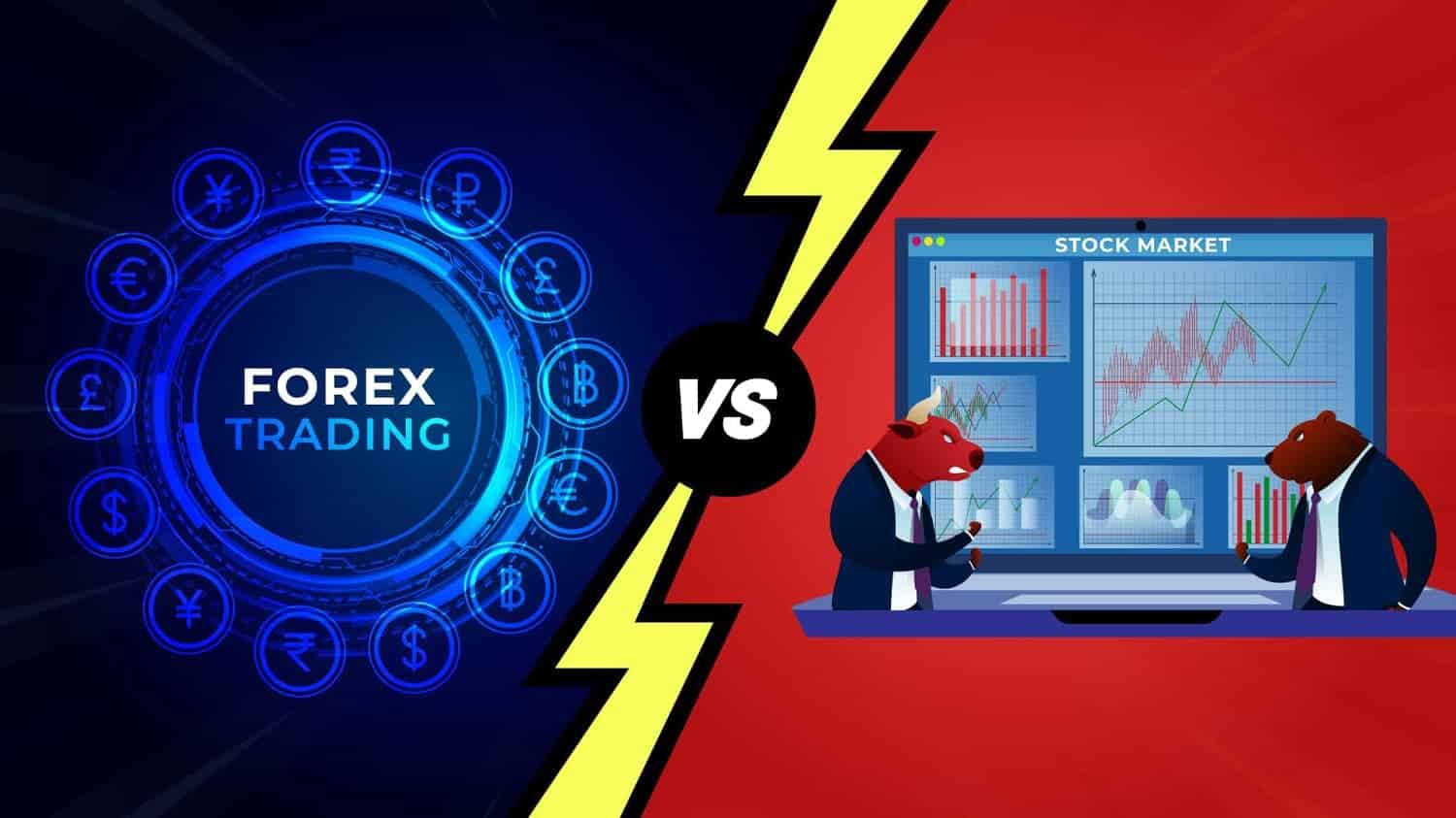- Home
- Forex News
- Forex Vs Stocks: Complete Overview
Forex Vs Stocks: Complete Overview

Those who are new to the trading world may think, “Forex Vs Stocks: Which is better to trade” There is no exact answer to this question. Whether we discuss this for seasoned traders or beginners, there are pros and cons for both markets and every trader type. Ultimately, it comes down to your personal preference on how essential every feature of these individual markets is for you. Let us look at both these markets individually before drawing a conclusion on which one is better: Forex or stocks?
Advantages and Disadvantages of Forex
Forex trading has its set of both advantages and disadvantages. Let us have a look at them in the table below:
| Advantages | Disadvantages |
| Low financial Bar to Enter: There is no minimum amount you need to begin investing in the Forex market as legally regulated. | Fewer Platform Options: All brokerage firms don’t offer Forex trading. So, you get limited options when it comes to choosing the platforms to trade. |
| Less Trading Options: Some people get overwhelmed by the total number of stocks available in the market to trade. The Forex market offers a few currency pairs only. Hence you can compare options before making trades. | The Danger of Leverage: At times, leverage can be an extremely powerful asset. It is a necessity when it comes to trading Forex. But leverage can promptly wipe away your initial deposits even if a single bad trade takes place. |
| More Liquidity: For selling stock, there should be someone to purchase it. Most of the transactions in the Forex market are instant. It is because of the large trading volume every day and the constant demands of currencies. |
Advantages and Disadvantages of Stocks
Before you choose to trade stocks, ensure to consider the advantages and disadvantages of trading in them:
| Advantages | Disadvantages |
| Simpler to get started: Nearly every broker offers to trade stocks. It means more options when choosing a broker and better control of the platform you use. | Limited Hours: Stock exchanged remains open from 9.30 in the morning to 4 in the evening only on weekends. Many of you may find it hard to trade stocks during volatile times of the day. |
| Higher Volatility: Stocks are more volatile as compared to currencies. Stocks can drop or rise to 5 percent in their value daily, and the worth of currency pairs can fall or rise by a fraction of pennies only. Hence, you can earn more profits with stocks without using leverage. | Day Trading Laws: Under the prescribed SEC laws, the regulatory body for the stock market, only traders having a balance of at least $25000 can put over 3- day trades in a week. |
| Many stocks to trade: Over 3000 stocks are on NASDAQ and over 2000 on NYSE. So, you can choose from various options to invest your hard-earned money. |
Does Forex Have Greater Risks Involved Than Stocks?
It is hard to find whether Forex has more risks involved than stocks or not. It comes down to the asset. The risk is generally calculated depending on the asset’s volatility. Since stocks are more volatile, more traders consider stocks to be riskier. But, it still depends on the mentality and strategies that you use while entering the market.
If you enter a market without any experience, knowledge, and strategies, you will likely lose more than what you win. So, never think that because one asset is less risky than another one, you will be safe with it. Regardless of how you look at it, all the financial markets are hard to navigate. Whether you trade stocks or currencies, you need to be very cautious.
What Are the Margins and Leverages Offered by Forex and Stocks?
A key benefit of Forex trading is the leverage offered by the Forex brokers. Using leverage, a Forex trader can make large profits even with a small amount of money. Though profits can be large, the losses in the FX market also can be multiplied. Hence, Forex trading becomes riskier than stocks. However, if you’re trading stocks physically, you will likely trade in them without the advantage of leverage. But if you trade in them using CFDs, you can then trade in them on margin. The best type of leverage offered generally is 1:10. Some Forex brokers even offer leverage of 1:500.
It provides the convenience of commanding a better position for a cash deposit. You must know how huge your underlying position is and the involved risks completely. Though leverage is a powerful tool, it can stop your activities in the trading world quickly.
Conclusion: Which Is Better?
There is no exact answer to which is better: Forex or stocks. There are pros and cons to each. Your decision will ultimately be based on your attitude towards risk and your personal preferences. However, when you make the decision, you should consider your financial goals and trading style.
When it comes to trading, you should always go with what works for you. Stay in your market of expertise. For those who are more interested in different companies, it is good for them to trade stocks. However, if you consider macroeconomics, Forex trading can be a better option. If you do not have too much inclination but are concerned about the transaction costs, then Forex trading can be perfect for you.
If you want to take the benefit of short-term to middle-term trends or lesser volatility, then the stock market is the best one for you. The instruments an investor or trader chooses should depend on the best mix of goals, risk tolerance, and strategies. But if you are looking for a speedy environment, then the FX market offers many opportunities like swing traders, scalp traders, and day traders. However, if you want to trade both assets then you must check on CMC Markets, as it allows stocks and forex trading both, therefore start your work with this platform and earn huge profit.
Now that you know how to rationalize between forex and stock options, you can also know more about the differences between stocks and bonds to get an in-depth analysis before investing.





